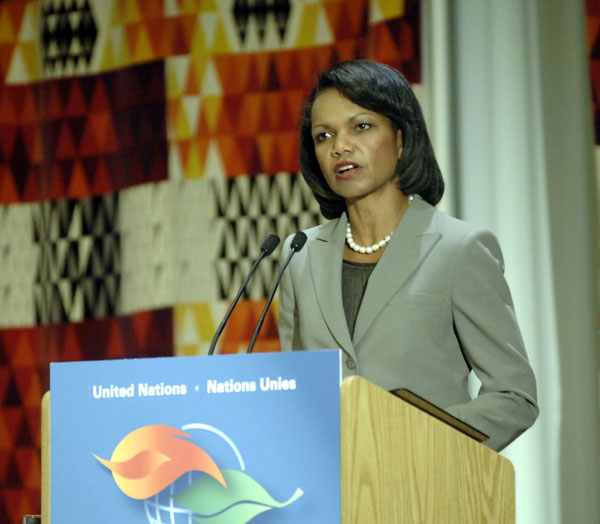Global warning on global warming: U.S. must help out


The keynote address to the gathering came from U.N. General Secretary Ban Ki-moon. “It has been 10 years since the Kyoto protocol was adopted. Yet most industrialized country emissions are still rising and their per capita emissions remain unacceptably high.”
Reuters reported on Ban's news conference: "Asked specifically what would happen if U.S. President George W. Bush continued to oppose mandatory limits on greenhouse gas emissions in favor of voluntary ones, Ban replied, 'I have high expectations of all countries, including ... the United States'."
Even Great Britain could not resist the poilitical pile-on. Here's how the British FT website described it: "Hilary Benn, [UK] secretary of state for the environment, used it to urge the US to reverse its opposition to binding targets to cut emissions.
'[Tackling climate change] means all of us, including the largest economy in the world, the US, taking on binding emissions reduction targets. It is inconceivable that dangerous climate change can be avoided without this happening.'
His words marked a change in tone for the UK in its approach towards the US on environmental issues. Tony Blair preferred to use his relationship with George W. Bush to press him privately to soften his stance on climate change."
The U.K. is a member of the European Union which is actually reducing its overall greenhose gas emissions as part of its adherence to the Kyoto Protocol. The U.S. and China are the world's two leading producers of greenhouse gases and neither is signatory to Kyoto. Both continue to annually produce more CO2. China, of course, claims it will take action and calls on the U.S. to get busy cutting emissions.
Bush is going to do something about climate change soon. In fact, he's inviting heads-of-state to Washington D.C. later this week to talk about it. Now, that's comforting. More hot air released into the atmosphere.
There is more government action on behalf of alternative energy and other measures to reduce global warming in Europe, Japan and other countries trying to adhere to Kyoto. It's not accidental that Japanese auto makers currently sell the most hybrid cars while Detroit lags. Nor is it accidental that E.U. countries drive far more diesel cars which are more fuel-efficicent that gasoline-burners. During the current political regime in Washington the official policy has been that Kyoto's mandatory emission limits would hurt the American economy.
Does anybody really believe that? Have hybrid cars hurt Toyota and Honda? Let's be frank: Bush, Cheney and Co. are convinced by their petroleum industry cronies that Kyoto would hurt the oil companies. I suspect the White House currently sees little difference between the oil industry and the overall American economy. But that's because, as often is the case, an established industry's leaders in America are looking backward. The American oil companies do NOT see themselves as energy companies. With their huge cash flow global oil companies could easily dominate solar, fuel cell, efficient battery, wind or any other alternative energy technology. But American companies do not work that way. Just as railroads ingnored the fledgling airline industry. Just as most newspaper companies botched their participation in radio and TV when those industries were new. We have recently witnessed Microsoft and the music indistry trying to grok the Internet. Why did Google come to dominate search? Because prior companies wouldn't or couldn;t put the developemtnenergy into building better search tools.
Expect the current big oil companies in America to try to ignore solar or whatever other alternative energy finally emerges to challenge their quarterly profits. The U.S. oil companies' top executives are necessarily focused on next quarter's earnings. They can ill afford to put any serious money into ventures that may not pay off. Large bonuses hang in the balance, and there's that shibboleth of "shareholder value." So the green tech research and development wil get done by start-ups in the U.S. and government-supported organizations in the Kyoto countries. You can bank on that.
If there is a change of government policy with the next U.S. President, expect there to be big growth at the NREL. Here's how their website describes the lab in Golden, Colorado: "NREL began operating in 1977 as the Solar Energy Research Institute. It was designated a national laboratory of the U.S. Department of Energy (DOE) in September 1991 and its name changed to NREL. NREL is the principal research laboratory for the DOE Office of Energy Efficiency and Renewable Energy and also provides research expertise for Office of Science, and the Office of Electricity Delivery and Energy Reliability. NREL is managed for DOE by Midwest Research Institute and Battelle."
As Florida and Texas got great economic gain from the space program, and as Georgia captured the National Institute of Health, or Virginia became home of many vendors working for the feds in Iraq...so Colorado may become the beneificary if government spending on alternative enmergy is stepped up.
That's an official State Deopartment photo of Secretary Rice at the U.N. conferernce.